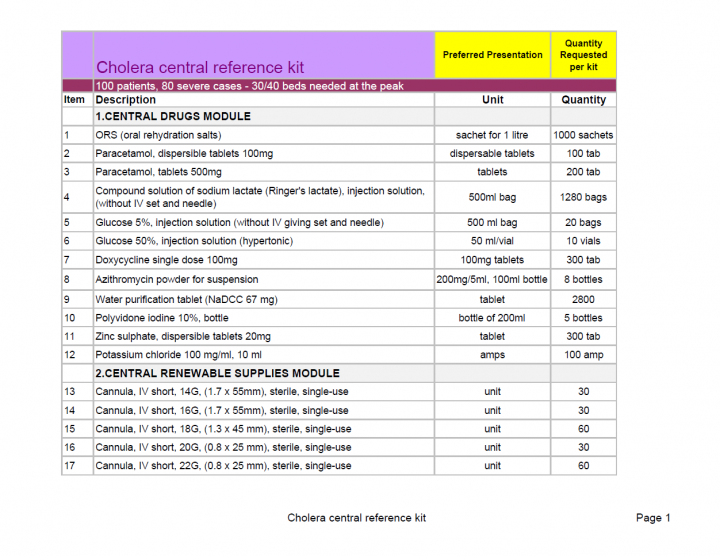Cholera central reference kit WHO (2020)
In 2016 WHO introduced the Cholera Kits. These kits replace the Interagency Diarrhoeal Disease Kit (IDDK) which had been used for many years. The Cholera Kit is designed to be flexible and adaptable for preparedness and outbreak response in different contexts. The overall Cholera Kit is made up of an Investigation Kit, Laboratory materials, 3 Treatment Kits (community, periphery and central) and a Hardware Kit. The Treatment and Hardware Kits are each composed of individual modules. Each of the kits and modules can be ordered independently based on field need. To support orders, a Cholera Kit Calculation Tool was developed. This course is made up of two parts: a short introduction to the Cholera Kits and modules, and a demonstration of the Cholera Kit Calculation Tool.
For several years, agencies supporting preparedness and response to cholera outbreaks have supplied medicines and medical devices through the Interagency Diarrhoeal Disease Kits (IDDK). In an effort to better align the presentation and content of the kits to field needs, the composition of the cholera kits has been reviewed by WHO and its partners in 2015 and again in 2020. The content of all modules have been slightly revised with no changes except for the cholera laboratory check list. The revised cholera kits 2020 are designed to help prepare for a potential cholera outbreak and to support the first month of the initial response for 100 cases. The overall package consists of six different kits, each divided in several modules.
Find more infortmation in the hyperlink below.
Bibliographic information
WHO (2020). Cholera central reference kit WHO
Filter / Tags
Politicians and local decision makersPractitionersGuidelines and manualsEnglish
External links
Find the revised Cholera kits here

